

Constitutions as Peace Treaties: A Cautionary Tale for the Arab Spring - ARD. In societies in transition, efforts to resolve deep divisions or fundamental disagreements about the nature of society through constitutional drafting may sharpen political differences and heighten the political salience of controversial issues or social cleavages.
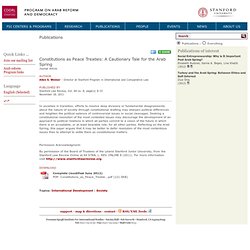
Seeking a constitutional resolution of the most contested issues may discourage the development of an approach to political relations in which all parties commit to a vision of the future in which there is an acceptable, or at least bearable role, for all other parties. Reflecting on the Arab Spring, this paper argues that it may be better to defer resolution of the most contentious issues than to attempt to settle them as constitutional matters. Permission Acknowledgment:
Writing a New Constitution. Constitutional Politics in the Middle East. This book is the first comparative and interdisciplinary study of constitutional politics and constitution-making in the Middle East.

The historical background and setting are fully explored in two substantial essays by Linda Darling and Saïd Amir Arjomand, placing the contemporary experience in the contexts, respectively, of the ancient Middle Eastern legal and political tradition and of the nineteenth and twentieth century legal codification and political modernization. These are followed by Ann Mayer's general analysis of the treatment of human rights in relation to Islam in Middle Eastern constitutions, and Nathan Brown's comparative scrutiny of the process of constitution-making in Iran, Afghanistan and Iraq with reference to the available constitutional theories which are shown to throw little or no light on it.
Gun Barrel Democracy? Democratic Constitutionalism Following Military Occupation: Reflections on the U.S. Experience in Japan, Germany, and Afghanistan and Iraq by Stanley N. Katz. Princeton University - Program in Law and Public Affairs Princeton Law & Public Affairs Paper No. 04-010 Abstract: This paper begins by arguing that the success of the United States in assisting in the creation of constitutional democracy in the post-World War II occupations of Germany and Japan is not relevant to establishing policies for the occupations of Afghanistan and Iraq at the present time.

Both Germany and Japan surrendered unconditionally, their wartime leadership was thoroughly discredited, and they had long pre-war traditions of democratic constitutionalism. None of these factors is present in the contemporary situation in the Middle East and Central Asia. Number of Pages in PDF File: 26 working papers series Suggested Citation Katz, Stanley N., Gun Barrel Democracy? Constitutionalism and democracy in Arab societies. School of International Relations. Constitutional Theory.
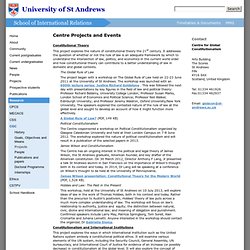
Constitutionalism and the rule of law in Egypt. The Rule of Law in the Arab World. Policing and Prisons in the Middle East: Formations of Coercion - SOAS Research Online. Piscatori - Islam, Islamists and the Electoral Principle in the Middle East. Constitutional Law: The Specificity of Middle Eastern Constitutionalism : Introduction to Middle Eastern Law Oxford Scholarship Online. Constitutional Law: The Specificity of Middle Eastern Constitutionalism DOI:10.1093/acprof:oso/9780199230495.003.0004.
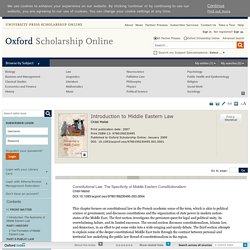
Resources. From Istanbul to Tabriz: Modernity and Constitutionalism in the Ottoman Empire and Iran. Sohrabi - What the Young Turks Knew about Other Revolutions and Why It Mattered. Constitutions in a Nonconstitutional World. OUP: Constitutionalism in Islamic Countries: Between Upheaval and Continuity: Rainer Grote. Prof.
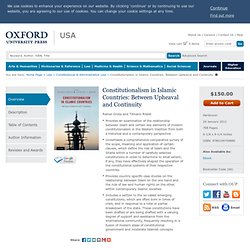
Dr. Khaled Abou El Fadl - Khaled Abou El Fadl is one of the leading authorities in Islamic law in the United States and Europe. He was named as a 2005 Carnegie Scholar in Islamic studies. Prof. Abou El Fadl teaches Islamic law, Middle Eastern Investment Law, Immigration Law, and courses related to human rights and terrorism at the UCLA School of Law. Dr. Prof. Zaid Al-Ali, LL.M. - Zaid Al-Ali studied law at King's College London, the University of Paris I (Pantheon-Sorbonne) and Harvard Law School. Prof. Dr. Dr. Emma Brown, MA - Emma Brown is a barrister-at-law, Middle Temple and practices at the Chambers of John Coffey QC, 3 Temple Gardens. Dr. Judge Eugene Cotran, LL.D. - Eugene Cotran served as a High Court Judge in Kenya until 1982. Islam and Constitutionalism - A Modest Introduction. Minimally, constitutionalism means government can and should be legally limited in its powers, and that authority is derived from and depends upon those limitations.
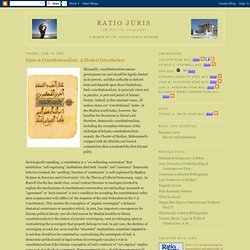
Such constitutionalism, in principle when not in practice, is part and parcel of Islamic history. Indeed, in this minimal sense, all nation-states are “constitutional” states. In the Muslim world today, however, the baseline for discussion is liberal and, therefore, democratic constitutionalism, including the exemplary relevance of the archetype of Islamic constitutionalism: namely, the Charter of Medina, Muhammad’s compact with the Muslim and Jewish communities that constituted the first Islamic polity.
Constitutional Politics in the Middle East - Arjomand - REVIEW.